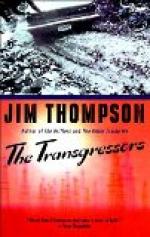“That’s right. It’s strange that history should repeat itself; and that we should be together to-night?”
“There is quite a difference between the murder of Lincoln and this series of crimes,” observes one of the younger men. “This night’s, or rather day’s, work is aimed at all classes of wealth. It is evident that it is an attack on capital. And the inexplicable part of the news is, that in every instance the murderers have cheated the gallows.”
“Come, move on there,” gruffly shouts a policeman.
“Hallo, Mason,” cries one of the club men as he pushes his way to the side of the policeman.
“O! How do you do, Mr. Castor,” says the blue-coat, in deferential tone.
“Mason, these are my friends; we want to stand here for a few minutes. It’s all right, isn’t it?”
“Certainly, it’s all right. I thought that you were a lot of the idle crowd, sir, and we have had orders to keep everyone on the move. But you’re all right.”
Mason had been appointed to the force by the Clubman’s influence.
Turning from his patron the policeman roughs his way through the crowd and makes the men and women “move on.”
“Nothing like having a friend at court, eh?” laughingly cries one of Mr. Castor’s friends.
“It is this custom of privilege that has brought on this calamity,” soberly observes the philosopher of the group.
A riot breaks out at this moment at the foot of the Franklin statue; and the shouts and curses of the men who are being beaten by the police send a thrill through the multitude.
The people on the fringe of the swaying thousands begin a retreat. Their action is quickly imitated.
The Clubmen decide that they have seen all that they want of the crowd. But the matter of getting out is not easy of accomplishment.
“What are you plug hats looking for?” sneers a rough from the slums. And his arm swings out and hits the foremost man in the face. This seems to be the cue for a dozen ruffians to fall upon the party of well dressed men.
Two policemen who stand nearby come to the rescue of the party and conduct them to a place of safety. From thence the sightseers are glad to make their way up-town.
The ambulances from the Hudson Street Hospital take four of the rioters who have been beaten with the night sticks of the police, to the station house. Under ordinary circumstances the prisoners would be taken to the hospital; but the Inspector of Police, who is on the scene, deems it advisible to take them to the Station house.
A sullen crowd of young men from the neighboring streets follow the ambulances, shouting execrations at the policemen who have made the arrests.
The hands on the clock in the cupola of the City Hall point to 2.15 A.M.
The news wagons are wedging their way through the sea of humanity. Morning papers are being sold by the ever vigilant newsboys. Still the people linger.




